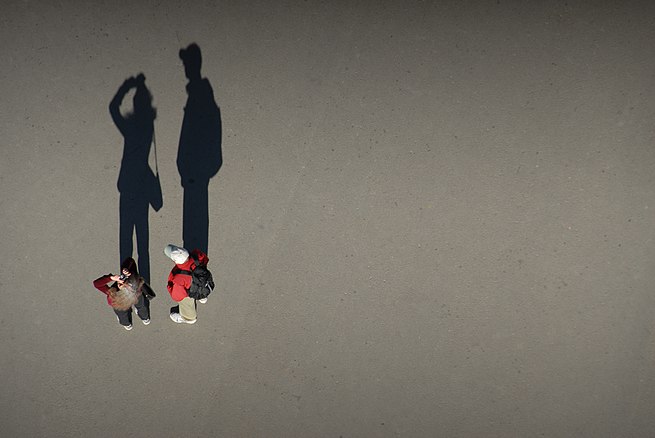
-
Shadow
A shadow is a dark area where light from a light source is blocked by an opaque object. It occupies all of the three-dimensional volume behind an object with light in front of it. The cross section of a shadow is a two-dimensional silhouette, or a reverse projection of the object blocking the light.
-
Shade (noun)
Darkness where light, particularly sunlight, is blocked.
“The old oak tree gave shade in the heat of the day.”
-
Shade (noun)
Something that blocks light, particularly in a window.
“Close the shade, please: it’s too bright in here.”
-
Shade (noun)
A variety of a colour/color, in particular one obtained by adding black (compare tint).
“I’ve painted my room in five lovely shades of pink and chartreuse.”
-
Shade (noun)
A subtle variation in a concept.
“shades of meaning”
-
Shade (noun)
An aspect that is reminiscent of something.
“shades of Groucho”
-
Shade (noun)
A very small degree of a quantity, or variety of meaning
-
Shade (noun)
A ghost or specter; a spirit.
“Too long have I been haunted by that shade.”
“The adventurer was attacked by a shade.”
-
Shade (noun)
A postage stamp showing an obvious difference in colour/color to the original printing and needing a separate catalogue/catalog entry.
-
Shade (noun)
Subtle insults.
“throw shade”
“Why did you paint your room chartreuse? No shade; I’m genuinely curious.”
-
Shade (verb)
To shield from light.
“The old oak tree shaded the lawn in the heat of the day.”
-
Shade (verb)
To alter slightly.
“You’ll need to shade your shot slightly to the left.”
“Most politicians will shade the truth if it helps them.”
-
Shade (verb)
To vary or approach something slightly, particularly in color.
“The hillside was bright green, shading towards gold in the drier areas.”
-
Shade (verb)
To move slightly from one’s normal fielding position.
“Jones will shade a little to the right on this pitch count.”
-
Shade (verb)
To darken, particularly in drawing.
“I draw contours first, gradually shading in midtones and shadows.”
-
Shade (verb)
To surpass by a narrow margin.
“Both parties claimed afterwards that their man did best in the debate, but an early opinion poll suggested Mr Cameron shaded it.”
-
Shade (verb)
To reduce (a window) so that only its title bar is visible.
“unshade”
-
Shade (verb)
To shelter; to cover from injury; to protect; to screen.
-
Shade (verb)
To present a shadow or image of; to shadow forth; to represent.
-
Shadow (noun)
A dark image projected onto a surface where light (or other radiation) is blocked by the shade of an object.
“My shadow lengthened as the sun began to set.”
“The X-ray showed a shadow on his lung.”
-
Shadow (noun)
Relative darkness, especially as caused by the interruption of light; gloom, obscurity.
“I immediately jumped into shadow as I saw them approach.”
-
Shadow (noun)
A reflected image, as in a mirror or in water.
-
Shadow (noun)
That which looms as though a shadow.
“I don’t have a shadow of doubt in my mind that my plan will succeed. The shadow of fear of my being outed always affects how I live my life. I lived in her shadow my whole life.”
-
Shadow (noun)
A small degree; a shade.
“He did not give even a shadow of respect to the professor.”
-
Shadow (noun)
An imperfect and faint representation.
“He came back from war the shadow of a man.”
“the neopagan ritual was only a pale shadow of the ones the Greeks held thousands of years ago”
-
Shadow (noun)
A trainee, assigned to work with an experienced officer.
-
Shadow (noun)
One who secretly or furtively follows another.
“The constable was promoted to working as a shadow for the Royals.”
-
Shadow (noun)
A type of lettering form of word processors that makes a cubic effect.
-
Shadow (noun)
An influence, especially a pervasive or a negative one.
-
Shadow (noun)
A spirit; a ghost; a shade.
-
Shadow (noun)
An uninvited guest accompanying one who was invited.
-
Shadow (noun)
In Jungian psychology, an unconscious aspect of the personality.
-
Shadow (verb)
To block light or radio transmission.
“Looks like that cloud’s going to shadow us.”
-
Shadow (verb)
To secretly or discreetly track or follow another, to keep under surveillance.
-
Shadow (verb)
To accompany a professional during the working day, so as to learn about an occupation one intends to take up.
-
Shadow (verb)
To make an identifier, usually a variable, inaccessible by declaring another of the same name within the scope of the first.
-
Shadow (verb)
To apply the shadowing process to (the contents of ROM).
-
Shadow (adjective)
Unofficial, informal, unauthorized, but acting as though it were.
“The human resources department has a shadow information technology group without headquarters knowledge.”
-
Shadow (adjective)
Having power or influence, but not widely known or recognized.
“The director has been giving shadow leadership to the other group’s project to ensure its success.”
“The illuminati shadow group has been pulling strings from behind the scenes.”
-
Shadow (adjective)
Acting in a leadership role before being formally recognized.
“The shadow cabinet cannot agree on the terms of the agreement due immediately after they are sworn in.”
“The insurgents’ shadow government is being crippled by the federal military strikes.”
-
Shadow (adjective)
Part of, or related to, the opposition in government.
